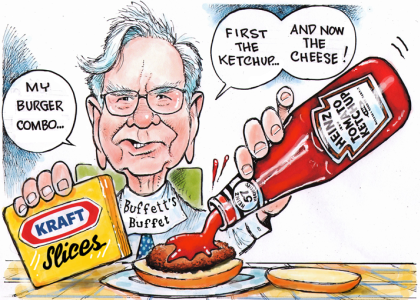OK. Warren has made a few bucks in his time, I give him that. Yet his largest investment to date: Kraft Heinz, has been a billion-dollar bust.
In 2013, Buffett and 3G Capital of Brazil bought Heinz for $28 billion and in 2015, Buffett and 3G financed Heinz’ purchase of Kraft. When the smoke cleared, Buffett and 3G were in for $49 billion and Buffett owned 27% of the new company: Kraft Heinz.
How’s the investment looking today? Not so hot. Kraft Heinz’ share price is less than half what it was when the merger was announced. Most recently, the company slashed per share dividends by 36% from 62.5 cents to 40 cents and took a $15 billion loss on two of its biggest brands, Kraft and Oscar Mayer.
To make matters worse, anticipated cost savings from combining Heinz and Kraft never materialized and the Federal Government is investigating Kraft Heinz’ “accounting practices.” On Monday May 6th, 2019, Kraft Heinz announced it’s going to issue “corrected” financial statements for 2016 and 2017. The prior ones were wrong due to “employee misconduct.” Expect some hefty class actions to be filed and possible jail time. A number of corporate officers have “left,” and the company has a new CEO who’s already making excuses.
Buffett lost $11.3 billion of stock value in 2018 and he’s down about $4.4 billion more in 2019.
Here’s what happened:
The Food Lawyers® Analysis: Buffett’s investment formula is pretty basic: Buy powerful brands and ride them. Examples of his successful bets are Apple computers, Coca-Cola and Geico Insurance. He tried the same strategy by buying Heinz and then Kraft. Those were smart investments in powerful brands, right? Wrong.
The public’s diet has shifted to healthy, natural, unprocessed foods. Those are three things that Heinz and Kraft have never stood for. Think of Kraft macaroni and cheese: Dry hard macaroni pieces with dried imitation cheese flavored powder and preservatives in a cardboard box.
Healthy, natural, unprocessed? I don’t think so.
Kraft Heinz saw the writing on the wall and is investing in new emerging healthy brands. That’s like a railroad company buying jet planes and driving them on their railroad tracks. When small edgy food companies get bought by big stodgy food conglomerates, the edgy company starts losing its edge. Pretty soon, it’s as dull as its owner. In the case of Kraft Heinz, there aren’t enough small healthy edgy food companies on the planet to transform Kraft Heinz into a model of healthy eating.
Also, national brands like Kraft Heinz and Del Monte are losing market share to store-owned brands like Ralphs “Private Selection™” and Costco’s “Kirkland Signature™” that offer national brand quality at much lower price points.
These changes have been going on for some time, but Buffett didn’t pick up on them when he bought Heinz and then Kraft. His timing couldn’t have been worse.
So now, Warren Buffett has to ask himself: “Should I stay or should I go?” Well, he can’t go because he’s Kraft Heinz’ biggest shareholder. If he starts selling his 27% stake, Kraft Heinz stock will sink faster than the Titanic and his losses will be magnified. If he stays, Kraft Heinz will continue to plummet and take Buffett’s storied career along for the elevator ride down.
The remedy? Kraft Heinz needs to decide what it wants to be. If it wants to keep being Kraft Heinz, it needs to become the best Kraft Heinz it can. Stick to what it knows how to do, control costs, and be the best packaged processed food producer on the planet. There will always be some customers out there. If, instead, Kraft Heinz wants to be a new age healthy food company, it’s going to have to change its corporate culture, start selling off its highly processed food divisions and plunge head first into healthy foods.
Either way, it’s going to be an ugly ride.
But I’m not on that bus. I didn’t follow Buffett and buy shares of Kraft Heinz when he combined the companies and I didn’t buy shares of Buffett’s investment company that owns 27% of Kraft Heinz. That’s because I’m smarter than Warren Buffett.
Sometimes.

